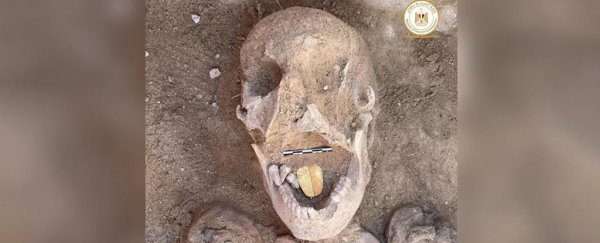Archaeologists have found a 2,000-year-old mummy with a gold tongue at an ancient Egyptian site called Taposiris Magna.
Embalmers perhaps placed the golden tongue on the mummy to ensure that the deceased would be able to speak in the afterlife, the Egyptian antiquities ministry said in a statement released Jan 29.
For instance, if the golden-tongued mummy encountered Osiris, the god of the underworld, in the afterlife, they would have needed to be able to speak to the god, the statement said. It isn't clear if the mummy had a speech impediment when they were alive. It's also not clear why the tongue was made out of gold specifically.
Related: The 25 most mysterious archaeological finds on Earth
The archaeologists, led by Kathleen Martinez, from the Dominican Republic, discovered the mummy in one of 16 burials at Taposiris Magna, which has temples dedicated to Osiris and Isis, a goddess who was both the wife and sister of Osiris. Previously, archaeologists found a hoard of coins decorated with the face of Cleopatra VII, suggesting the temples were in use during the queen's reign.
 Female mummy whose death mask covered much of her body. (Egyptian antiquities ministry)
Female mummy whose death mask covered much of her body. (Egyptian antiquities ministry)
More mummies
The other 15 burials also date back around 2,000 years and contain remarkable treasure. In one, a female mummy is wearing a death mask that covers much of her body and depicts her with a headdress while smiling.
Two of the mummies were found with the remains of scrolls, which scholars are currently analyzing and deciphering. The plastered layers, or cartonnage, encasing one of these mummies has golden decorations of Osiris, the statement said.
The researchers also found several statues that depict the people who were buried at the site; the statues are so well preserved, you can still make out the individual's hairstyles and headdresses, the statement said. The statues give the people a formal look, with no smiles on their faces.
 Depiction of deceased man, with detailed hairstyle. (Egyptian antiquities ministry)
Depiction of deceased man, with detailed hairstyle. (Egyptian antiquities ministry)
Though the archaeologists aren't sure exactly when the individuals died, they can tell that the people lived at a time when Egypt was ruled either by the Ptolemies (304 BCE to 30 BCE), who were the descendants of one of Alexander the Great's generals, or by the Roman Empire, which took over the country after the death of Cleopatra VII in 30 BCE.
A team made of archaeologists from Egypt and the University of Santo Domingo in the Dominican Republic are conducting these excavations at Taposiris Magna. It is led by Kathleen Martinez, an archaeologist from the Dominican Republic. Excavation of the site and analysis of the remains is ongoing.
Related content:
Photos: Egypt's 'Great Terrace of God'
Bones with names: Long-dead bodies archaeologists have identified
30 of the world's most valuable treasures that are still missing
This article was originally published by Live Science. Read the original article here.
